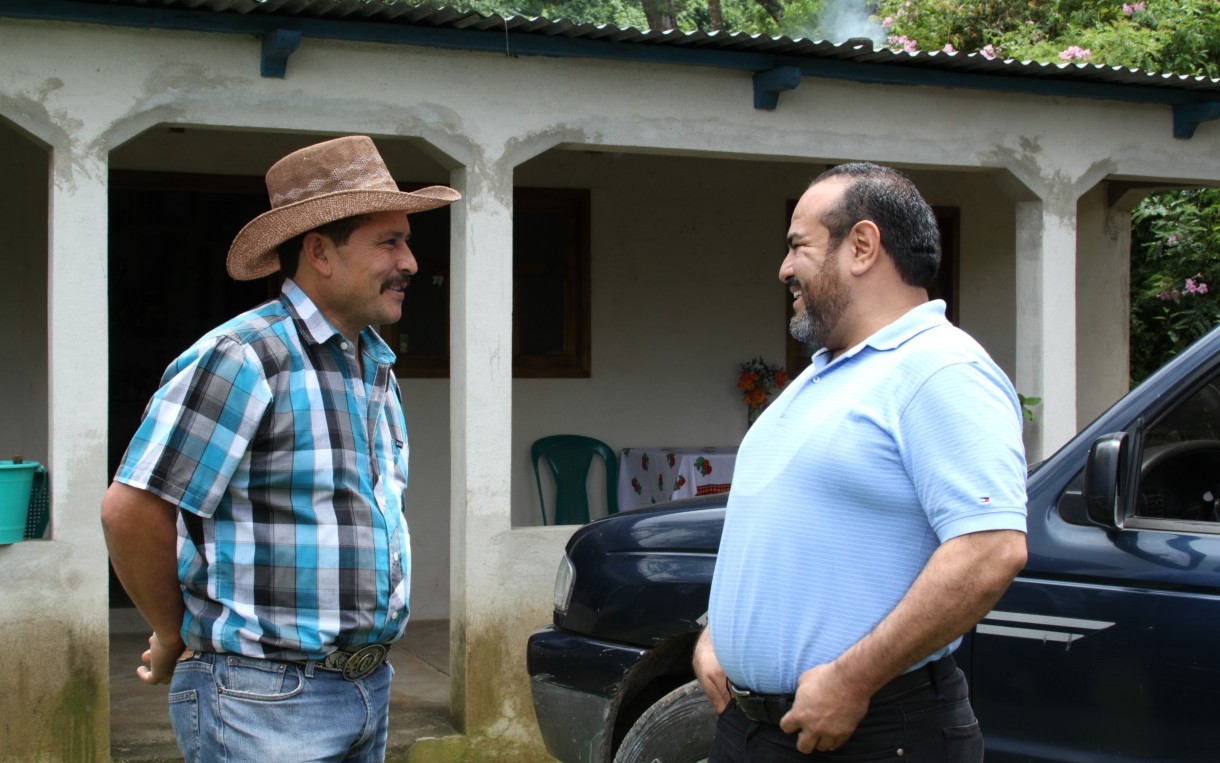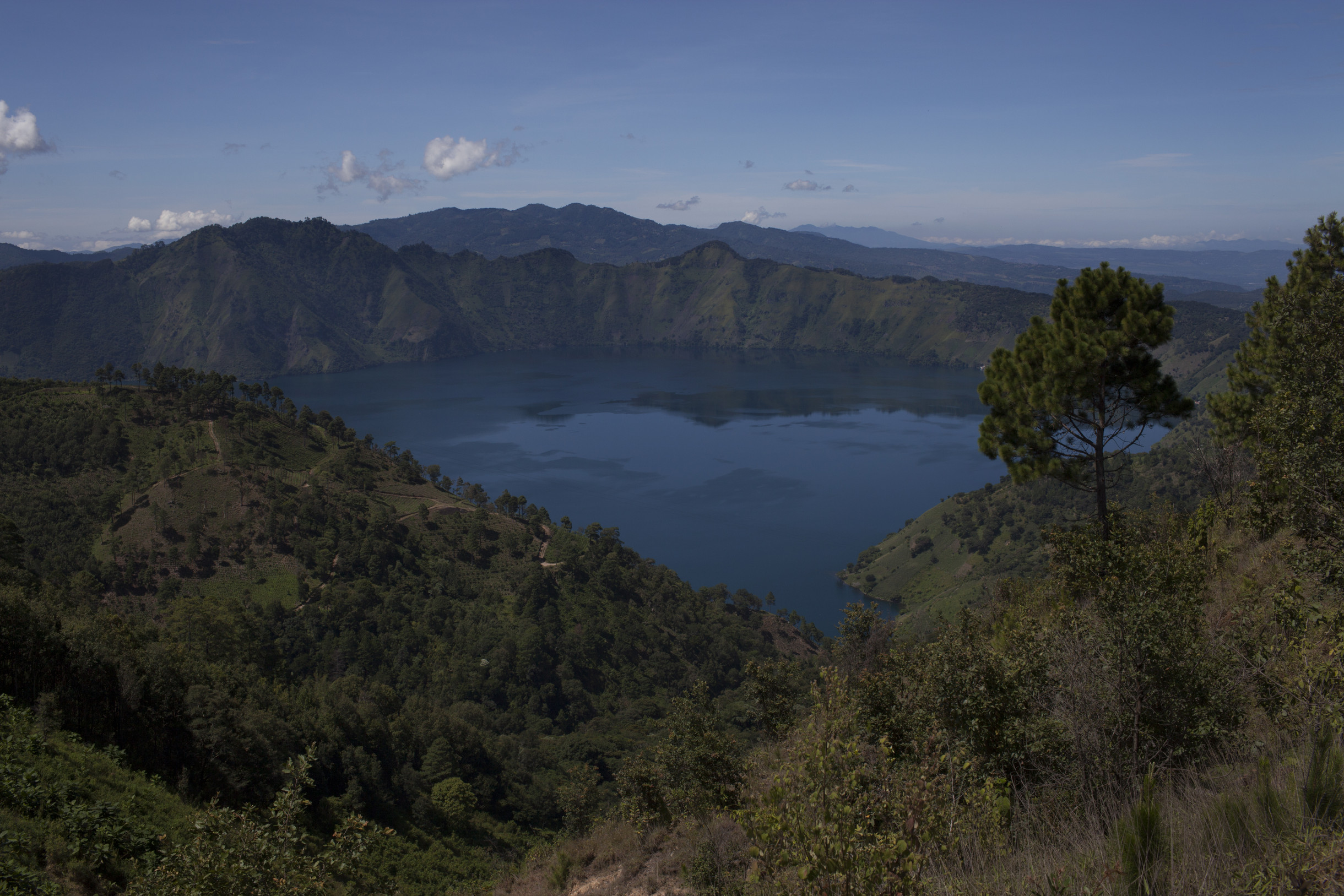Violence, and bogus charges against human rights defenders in Guatemala continue
 Rafael Maldonado (right) meets with farmer Guillermo Carrera at Carrera’s home near San Rafael Las Flores, Guatemala. Carrera was one of the people unjustly accused of numerous crimes, and spent months in jail before being released for lack of evidence. Photo: Chris Hufstader/Oxfam America
Rafael Maldonado (right) meets with farmer Guillermo Carrera at Carrera’s home near San Rafael Las Flores, Guatemala. Carrera was one of the people unjustly accused of numerous crimes, and spent months in jail before being released for lack of evidence. Photo: Chris Hufstader/Oxfam America
Legal advisor comes to US to accuse state, mining company of campaign against activists
When the vice president of Guatemala resigned amidst suspicion of corruption, I raised an eyebrow. When the president had to resign, and was then put in jail and accused of corruption, I wondered aloud if the country might be turning a corner. And if maybe new leaders in the country might bring some measure of justice to the people fighting the El Escobal silver mine near Guatemala City.
After all, a Guatemalan Tribunal has ruled that the permit to operate the mine, issued in 2013 to Tahoe Resources despite widespread opposition from local people, was a violation of the right to due process and the matter is now with the Guatemalan Constitutional Court.Many of the political leaders now under suspicion of corruption and possibly facing justice may have been involved in arrangements to allow the Tahoe mine to operate despite a lack of consultation with local communities.
When I visited the area in 2014 I interviewed local farmers who had been outspoken critics of the mine and then falsely accused of violent crimes; later the bogus charges were dropped for lack of evidence – but not until after some were jailed, others went into hiding for months at a time. (You can see the magazine story (page 8) here.) It was pure state-sponsored harassment. Will anyone now be held responsible for these abuses of power? I’m waiting to see before I get too excited.
Two weeks ago my optimism was tempered by a violent attack against Alex Reynoso and two others as they were leaving a meeting with the newly re-elected mayor of Mataquescuintla, Dr. Hugo Loy. “He was shot multiple times, but now he is stable,” says Rafael Maldonado, an attorney for the Center for Environmental and Social Legal Action (known as CALAS), who spent two days with me in Mataquescuintla and San Rafael Las Flores (where the mine is currently located) in 2014. He pointed out that this was the second time that Reynoso had been violently attacked. He was gravely wounded in 2014 in an attempt on his life — when his teenage daughter Topacio was shot and murdered.
Maldonado is leading the legal strategy to get some justice for the people living near the El Escobal mine. He was in Washington last week to attend meetings at the Inter-American Commission for Human Rights (IACHR), and to testify in front of a Congressional hearing. “The false accusations of serious crimes (including kidnapping, illegal detention, arson…) were developed for the San Rafael mining company, a subsidiary of Tahoe Resources… and the state of Guatemala by the National Civil Police and the public prosecutor,” Maldonado testified. (He also brought evidence of water pollution from mining in Guatemala as part of a larger Latin America submission to the commission about mining-related violations of the right to water.)

Campaign of “criminalization”
Maldonado contends that there is a state- and company-sponsored strategy of framing mine opponents, what they call in Spanish “criminalization.” “Through this process of criminalization, at least 150 human rights defenders … faced legal charges,” Maldonado says in his statement. “To this date none of them have been convicted for said charges, on the contrary, judges have rejected each and everyone one of the cases presented — proving that these charges are products of a criminalization strategy targeting the social protest against the imposition of the mining project at the El Escobal Mine.”

Seeking justice
Here’s the thing about Maldonado’s accusations: He’s an attorney and he can back them up with evidence. That’s why he’s been targeted as well. He says the sister of the manager of the Tahoe mine publicly threatened to kill him, and someone fired shots outside his office recently while he was preparing for a hearing. However he says that he is “not going to allow these types of threats to stop the efforts of CALAS to seek justice.”
Despite the attack on Reynoso, Maldonado says the country is undergoing what he calls a “civil awakening.” “I want people in the US to see that we’re standing up and asking for a new system without corruption.” However he says that the two leading candidates in the recent presidential election do not oppose industrial mining in Guatemala; “it’s a corrupt structure but they support it.” However the president-elect, Jimmy Morales, well known as a TV comedian and a political outsider, came in to office with promises to fight corruption.
Maldonado says Guatemalans are willing to “raise their voices against the corrupt structure of mining in Guatemala,” but will the Morales administration push for investigations into the “criminalization” campaign and violent attacks against people in San Rafael and Mataquescuintla? If he does both my eyebrows might finally go up at the same time.